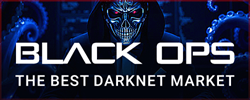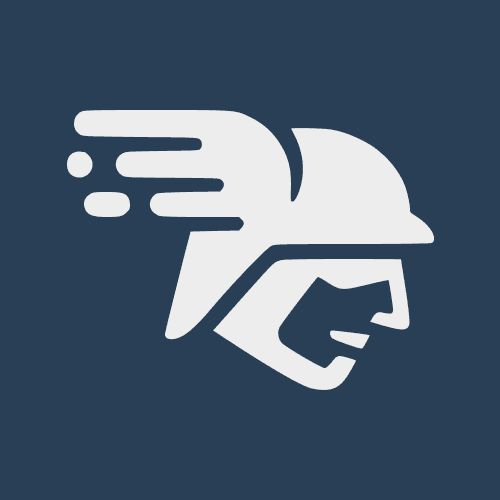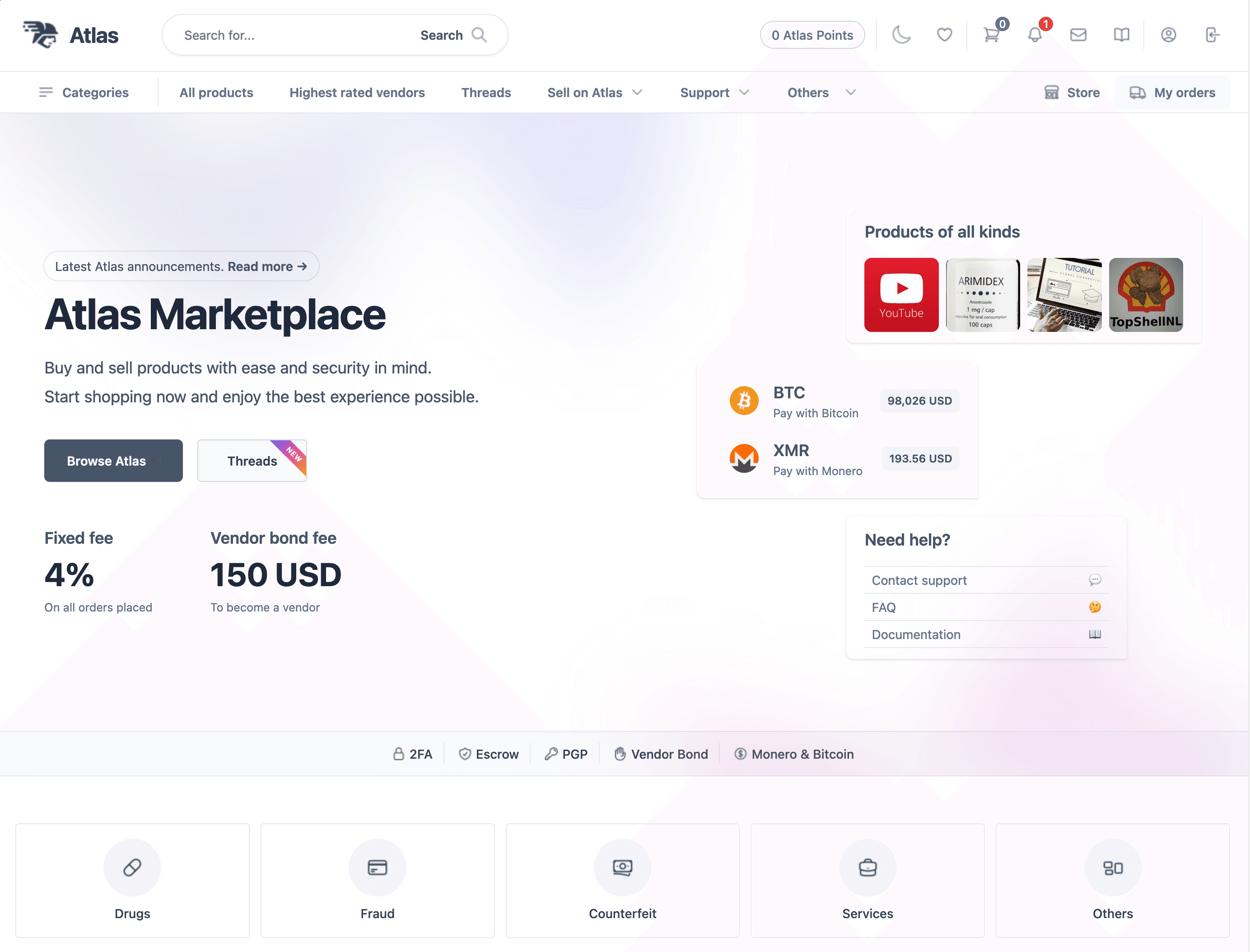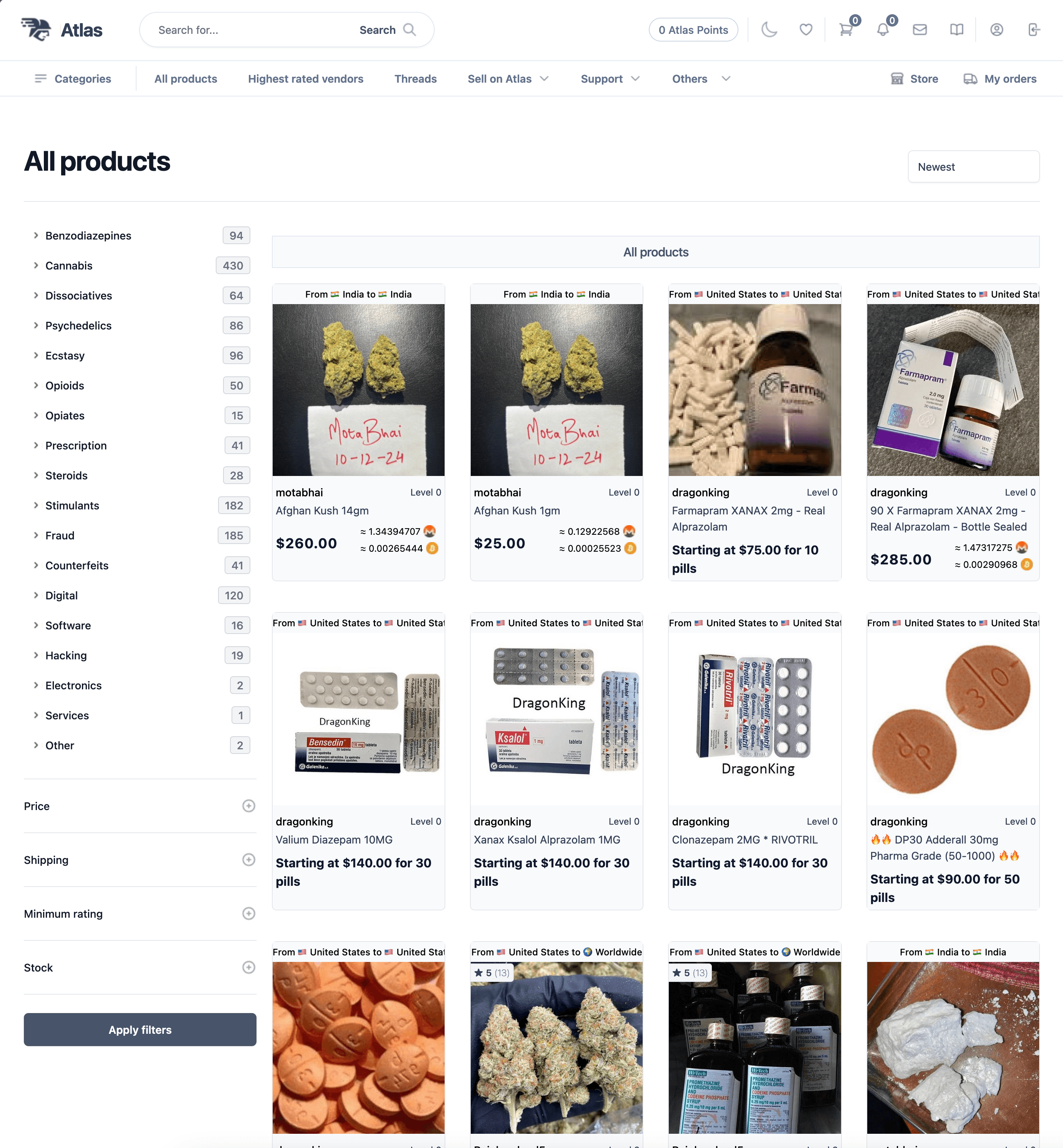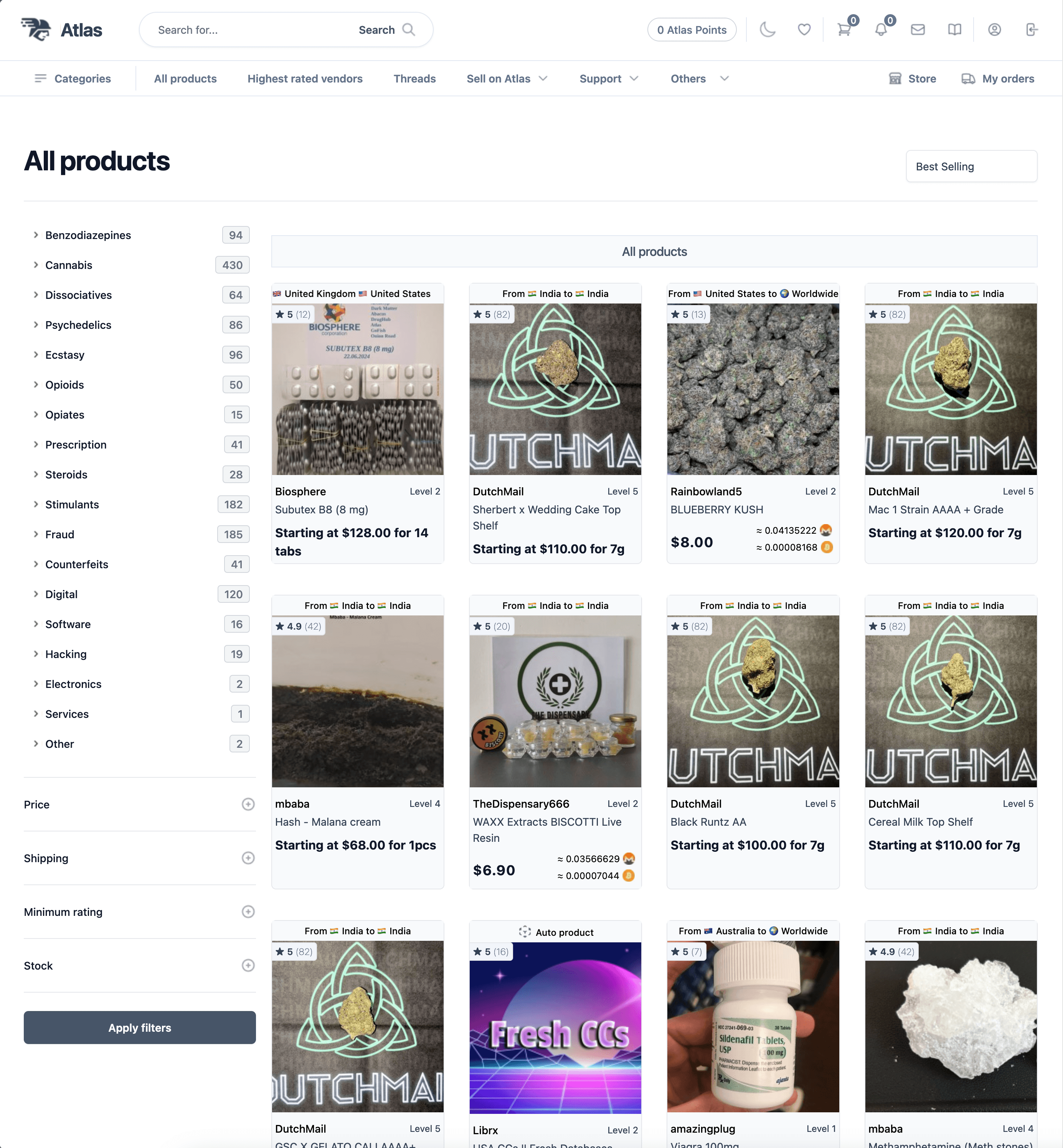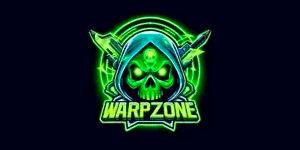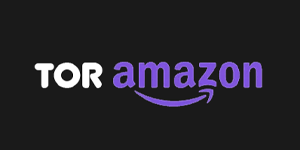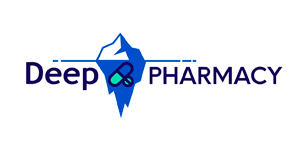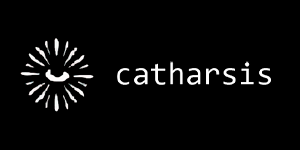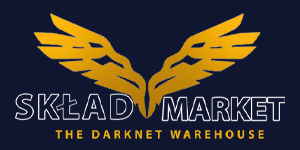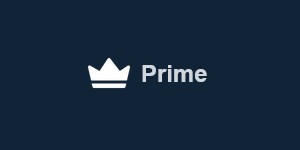Last Updated on November 27, 2025 by DarkNet
ATLAS MARKET ONION LINK:
http://atlasm7kex3qqua4earqsvy43je3zt5cwj7qa4ovlqfltbtar7qmvyyd.onion
ATLAS MARKET MIRRORS:
http://atlasbmfrc4f4aefknb3h4yxjaramaiqek5fnnsu2vnxc3ghx2m2u2qd.onion
http://atlasl7f4dfqitresdi3hz4wo2td3xthllvqdr2om2ciiqqn73i3psid.onion
http://atlas6twqs4xlu5usolrgvdwjgbtsicukr6izd6atasxw7w5wszuiayd.onion
http://atlasiixaig3ka3idlxfuisbgdvbqoauqt4qwng7ybfz2jreqa6tkdqd.onion
http://atlasm2hln6k5pv776tg2hsji64ihadeyxetzy2vayxn7iamxfslmvqd.onion
http://atlasvkgapulldbjorgi25lacrp53x7zg7rnzoxn4w7nbln6obbkhmad.onion
http://atlaszvsq6dceezso6zrugmkwozbs7kliiy6e2e2m2jr4tizlrkyriid.onion
http://atlasf4j2h5heimi6p27hxntjqvee5xcjraudknwgikl43u7vhnyp2ad.onion
Introduction
In the ever-evolving landscape of the darknet, Atlas Market has emerged as a rising contender among digital black markets. As 2025 unfolds, global crackdowns on centralized platforms and increasing demand for privacy-driven commerce have pushed users deeper into encrypted, decentralized marketplaces. Atlas Market, with its sleek interface and enhanced security protocols, is quickly capturing the attention of both vendors and buyers seeking refuge from takedowns and scams.
The relevance of this topic has never been greater. With traditional darknet giants either dismantled or compromised, users are on the lookout for safer, more reliable alternatives. Atlas Market represents not only a technological shift but also a cultural one—where trust, encryption, and reputation are the new currency.
Disclaimer: This article is intended for educational and informational purposes only. It does not promote, encourage, or support any form of illegal activity.
The Rise of Atlas Market
Launched in early 2023, Atlas Market quickly made waves in the darknet ecosystem as a clean, modern alternative to legacy marketplaces weighed down by technical debt, trust issues, or law enforcement infiltration. While little is definitively known about the creators of Atlas Market, rumors circulating on Dread and other darknet forums suggest that its operators are experienced vendors and developers who previously worked behind the scenes of defunct platforms. Their stated mission was to build a “resilient, community-driven market immune to the mistakes of its predecessors.”
Atlas Market’s rise can be attributed to both strategic timing and functional appeal. It entered the scene in the aftermath of major shutdowns like Empire, White House Market, and the more recent turbulence surrounding Versus Market. These closures left a vacuum for users seeking a stable and secure platform. Atlas capitalized on this void by offering:
-
A smooth and intuitive user interface.
-
Enhanced security features such as mandatory PGP encryption and multisig escrow.
-
A transparent reputation system for vendors and buyers.
-
Regular updates and communication from admins—something sorely missed on stagnating platforms.
Word spread quickly through darknet communities and Telegram channels, with many users praising Atlas for its “no-nonsense” approach and modern infrastructure. Unlike the flashy yet buggy design of some markets, Atlas prioritized functionality, uptime, and reliability—earning it a loyal following in a short time.
In the broader context, Atlas is often compared to legendary platforms like AlphaBay, which set the standard for professionalism and scale, or Empire Market, which initially gained trust but ultimately collapsed in an exit scam. Unlike its predecessors, Atlas Market positions itself not as a replacement, but as an evolution—leaner, smarter, and more decentralized by design.
Whether it will endure remains to be seen, but its rapid ascent suggests a growing appetite for darknet markets that balance usability with robust operational security.
User Interface and Experience on Atlas Market
Atlas Market sets itself apart from many darknet competitors with a clean, responsive, and modern interface that focuses on usability without compromising security. Designed with both novice and experienced users in mind, the platform offers a seamless browsing experience that echoes the intuitive design of clearnet e-commerce sites—while remaining fully accessible over the Tor network.
Sleek, Minimalist Design
The overall aesthetic of Atlas is minimalist, prioritizing clarity over clutter. Upon logging in, users are greeted by a dashboard that highlights essential tools: account balance, recent messages, and recommended listings. The interface supports both light and dark modes, catering to user preferences and readability.
Navigation and Structure
Navigation is streamlined through a top bar and sidebar layout, allowing users to jump quickly between key sections:
-
Marketplace – Search and filter products by category, vendor, or price range.
-
Messages – Encrypted communication using mandatory PGP.
-
Orders – Track current and completed transactions with detailed order status.
-
Wallet – Manage deposits and withdrawals in supported cryptocurrencies.
-
Support – Direct access to ticketing for disputes or technical help.
Each section loads quickly, with consistent design elements and clear headings that reduce confusion—especially for first-time users.
Vendor Pages and Listings
Vendor profiles are structured for transparency. Each page includes:
-
Vendor rating and number of completed sales.
-
PGP public key and registration date.
-
Shipping origin and delivery regions.
-
Detailed product listings with high-resolution images, descriptions, and delivery policies.
Buyers can view feedback scores and read written reviews before making a purchase, which helps build trust in a reputation-driven economy.
Buyer Tools and Features
Atlas Market includes several tools aimed at improving buyer experience:
-
Advanced Search Filters – Narrow results by category, price, shipping country, and accepted payment.
-
Wishlist Functionality – Save favorite products and vendors for later review.
-
Escrow and Finalize-Early (FE) Indicators – Clearly marked on listings to inform users of payment conditions.
-
PGP Integration – Simplifies secure communication by automatically encrypting messages when a buyer uploads their public key.
Overall, the platform balances security with user-friendliness—a combination that has helped Atlas grow its user base and establish itself as a serious competitor in the darknet space.
Product Categories and Marketplace Structure
Atlas Market offers a wide range of products and services, aligning closely with the inventory typical of modern darknet marketplaces. However, what distinguishes Atlas is its well-organized structure and a set of internal policies that aim to strike a balance between open commerce and operational control.
Core Product Categories
The marketplace is divided into clearly labeled sections, each hosting hundreds or thousands of listings. The primary categories include:
-
Drugs & Chemicals – This remains the most active section, with subcategories for cannabis, psychedelics, opioids, stimulants, prescription medications, research chemicals, and more.
-
Digital Goods – Offers a mix of streaming credentials, cracked software, hacked accounts, and security tools.
-
Fraud-Related Items – Includes fake IDs, bank logs, credit card dumps, PayPal accounts, and other financial instruments often used for fraud.
-
Guides & Tutorials – PDFs and ebooks on topics like carding, OPSEC, social engineering, and cryptography.
-
Counterfeit Items – Fake currency, designer clothing, and replica products.
-
Services – Includes hacking-for-hire, spam campaigns, and document forgery services.
Each listing features detailed descriptions, vendor-specified terms, shipping information, pricing (typically in BTC or XMR), and buyer protections such as escrow status.
Subcategory Precision
One of Atlas Market’s strengths is its deep subcategorization, which allows users to navigate quickly and filter listings by product type, shipping origin, destination, and even vendor trust level. For example, under “Drugs,” users can select “Stimulants” and then filter further by “Domestic US” or “EU Only.”
This level of granularity significantly improves usability and reduces the time buyers spend searching through irrelevant or high-risk listings.
Moderation and Prohibited Content
While Atlas Market does not enforce strict ideological rules, it does maintain a set of prohibited categories, which are enforced by both automated filters and active moderation. Banned listings include:
-
Child exploitation material.
-
Weapons and explosives.
-
Hitman services.
-
Human trafficking-related content.
-
Any listing that draws direct law enforcement attention or violates ethical red lines even by darknet standards.
Vendors who attempt to list prohibited goods are typically banned and their accounts removed. This moderated approach has helped Atlas maintain a cleaner reputation compared to more chaotic marketplaces.
Final Structure and UX Notes
Every product listing contains:
-
A thumbnail image.
-
Product title and vendor name.
-
Star rating and number of sales.
-
Escrow status and FE option (if enabled).
-
Tags indicating shipping zones and currency.
This structure mirrors professional online shopping interfaces, giving the marketplace a familiar and efficient flow that appeals to both seasoned darknet users and newcomers alike.
Security Features and User Protection
Atlas Market emphasizes security as a core part of its design, implementing multiple technical safeguards to protect both buyers and vendors. From login protocols to financial transaction systems, the platform adopts industry-standard practices tailored to the anonymity-focused nature of darknet commerce. While no system is invulnerable, Atlas provides users with a solid framework for minimizing risk when used correctly.
Authentication and Login Protection
Atlas requires all users to register with a username, password, and 6-digit PIN, creating a multi-layered login process that deters brute-force attacks. The platform also supports and strongly encourages PGP-based two-factor authentication (2FA). Once enabled, users must decrypt a unique login token with their private key every time they sign in—ensuring that even if login credentials are compromised, unauthorized access is still blocked.
Sessions expire automatically after short periods of inactivity, and suspicious login attempts trigger account lockouts or CAPTCHA challenges to further reduce exposure.
PGP Encryption and Messaging
Secure messaging is a cornerstone of Atlas’s operations. All communications between users, vendors, and support are conducted using mandatory PGP encryption. Buyers must upload their public key to enable transactions and encrypted message exchange.
This system protects order details (including shipping information) and dispute correspondence, ensuring that even if the platform were compromised, exposed message logs would remain unreadable without the corresponding private keys.
Escrow and Multisignature (Multisig) Transactions
Atlas uses a default escrow system, holding buyer funds until an order is marked as delivered. If disputes arise, funds remain frozen until resolved by moderators.
For enhanced security, Atlas also supports multisignature (multisig) escrow. In a typical 2-of-3 setup, three private keys are held by the buyer, the vendor, and the market. Funds can only be released when at least two of these parties agree. This system reduces reliance on centralized wallet controls and mitigates the risk of an exit scam, since the market alone cannot move user funds unilaterally.
Reputation and Trust Metrics
Reputation plays a central role in user safety. Each vendor and buyer has a trust score based on:
-
Successful transactions.
-
Written feedback from other users.
-
Dispute outcomes.
-
Account age and activity level.
Vendors with consistent positive reviews gain access to privileges like Finalize Early (FE), which allows them to receive payment before delivery—but only once a strong reputation is established. All vendor profiles display key metrics such as registration date, total sales, and PGP fingerprint.
Buyers are encouraged to leave detailed reviews after each order, and vendors who repeatedly fail to deliver or receive negative feedback are delisted quickly.
Anti-Phishing Systems
Phishing is a persistent threat in darknet environments, and Atlas incorporates several defenses:
-
User-defined anti-phishing phrases: When set, these phrases appear on the login page and serve as a visual cue that users are on the legitimate site.
-
PGP-signed mirror lists: Official .onion addresses are distributed through signed messages posted on Dread and other verified channels.
-
Mirror rotation: Atlas operates multiple mirrors to maintain uptime and confuse traffic analysis attempts by attackers.
-
Login attempt monitoring: Suspicious behavior—such as repeated failed logins from the same IP—is flagged and temporarily blocked.
Support and Incident Response
Atlas has a ticket-based support system that handles security-related issues such as:
-
Frozen orders.
-
Missing deposits or stuck withdrawals.
-
Dispute resolution.
-
Account compromise recovery (via PGP verification).
Response times vary, but users commonly report replies within 24–48 hours for most issues. Security warnings, mirror updates, and community alerts are also periodically posted via the site’s announcement feed and on Dread.
Atlas Market offers one of the most robust security stacks currently available on the darknet. By combining strong cryptographic tools with a transparent trust system and active moderation, the platform gives users the infrastructure they need to trade with confidence—provided they follow best practices and maintain good personal OPSEC.
Technology Behind Atlas Market
Atlas Market has established a reputation not only for security and usability but also for technical stability and architectural foresight. While darknet platforms rarely disclose detailed backend information for obvious reasons, a combination of public observations, user reports, and admin statements gives insight into how the platform is structured and how it maintains operational resilience.
TOR Access and Mirror Infrastructure
Atlas operates exclusively through the Tor network, offering a rotating set of verified .onion mirrors. These mirrors are distributed via PGP-signed announcements on forums like Dread, enabling users to authenticate the legitimacy of URLs and avoid phishing clones.
The use of multiple mirrors improves both uptime and anonymity. Users report that the platform loads quickly and reliably across all access points, with automatic redirection in the event of a server or mirror failure.
Although support for I2P (Invisible Internet Project) is not currently active, there are occasional discussions in the community speculating about potential expansion. For now, Tor remains the sole access channel.
DDoS Protection and Uptime Management
Atlas has demonstrated strong resistance to distributed denial-of-service (DDoS) attacks, a common threat to darknet markets. This is achieved through:
-
Rate limiting and request throttling, particularly during login or search activity.
-
CAPTCHA verification during session initiation.
-
Mirror rotation and traffic distribution, which prevent a single point of failure from disabling access.
-
Potential use of backend obfuscation or layered hosting, although specifics are unconfirmed.
These mechanisms have helped Atlas maintain high uptime consistency—users report 98–99% availability, even during peak traffic or periods when other markets experience outages.
Backend Performance and Architecture
While the specific framework is not publicly documented, Atlas appears to run on a custom fork of a hardened market engine. The interface is both fast and responsive, with asynchronous message handling, dynamic product listings, and a lightweight transaction history module.
Key performance characteristics include:
-
Real-time wallet balance updates following blockchain confirmations.
-
Efficient order processing and status tracking, including automated timers for escrow release and dispute deadlines.
-
Vendor dashboard tools for inventory management, sales analytics, and auto-response settings.
The backend likely separates services into modular components, minimizing cross-service dependencies and enhancing recoverability in case of partial failure.
Reported Bugs and Technical Issues
Atlas has thus far avoided any high-profile technical breaches, such as database leaks or mass deanonymization. That said, minor issues have been observed:
-
Occasional wallet sync delays, particularly during congestion on BTC and XMR networks.
-
Mobile layout bugs, including misaligned buttons or input errors in certain browsers.
-
Delayed order confirmation statuses, typically resolved without admin intervention.
Admins appear responsive to bug reports, and patches are rolled out discreetly without major disruption to live services.
Transparency and Development Philosophy
One factor contributing to Atlas’s growing reputation is its development transparency. Admins occasionally post updates about new features, mirror health, and infrastructure upgrades. These messages are PGP-signed and shared across official channels, fostering a sense of accountability rare among darknet markets.
Atlas Market demonstrates a high level of technical maturity for a relatively new platform. Its modular infrastructure, attention to uptime, and layered DDoS defenses position it as one of the most stable darknet markets in operation today. While no system is invulnerable, Atlas shows signs of being engineered for the long haul—quietly robust, not flashy, and built to withstand the volatility of its environment.
Cryptocurrency and Payment System
Atlas Market employs a cryptocurrency infrastructure designed for anonymity, security, and flexibility, allowing users to fund transactions with minimal friction while maintaining a high level of financial privacy. The platform supports a select group of coins, utilizes an internal wallet system, and provides clear protocols for deposits, withdrawals, and vendor payments.
Supported Cryptocurrencies
As of 2025, Atlas Market supports the following digital assets:
-
Bitcoin (BTC) – The most commonly used cryptocurrency across darknet markets, supported for all transactions.
-
Monero (XMR) – Favored for its native privacy features, such as stealth addresses and ring signatures.
-
Litecoin (LTC) – A fast, low-fee option available for certain product categories and vendors.
Each currency is supported across all major marketplace functions, including wallet management, purchases, and withdrawals. Monero is frequently recommended by vendors and Atlas administrators for users prioritizing maximum anonymity.
Deposits and Internal Wallet System
Users must deposit funds into their Atlas wallet before making purchases. Each deposit generates a unique, per-user cryptocurrency address that rotates periodically for additional privacy. Deposit instructions clearly outline the required number of network confirmations:
-
BTC: Typically requires 2–3 confirmations.
-
XMR: May require 10+ confirmations due to protocol design.
-
LTC: Generally requires 2–5 confirmations.
Funds appear in the wallet dashboard once confirmed, allowing users to place orders, leave tips, or settle disputes.
Wallet balances are denominated in the respective cryptocurrency, and Atlas provides up-to-date price conversion references to help users compare costs across vendors and coins.
Withdrawals and Fees
Withdrawals are manually processed to improve security and reduce the risk of automated fraud. While processing times vary, most users report successful withdrawals within 12–48 hours.
-
Network fees: Applied per transaction based on blockchain conditions (e.g., Bitcoin congestion).
-
Platform fees: Atlas charges a small withdrawal fee, typically ranging from 1% to 2%, depending on the coin and user tier.
-
Withdrawal limits: May be imposed on newly registered accounts or during periods of suspected fraud or network stress.
Users are encouraged to withdraw funds as soon as transactions are completed, rather than holding large balances in their Atlas wallet.
Escrow and Finalize Early (FE) Payments
By default, all purchases are protected by an escrow system, where funds are held by the market until the buyer confirms delivery. Upon confirmation, funds are released to the vendor.
For reputable vendors with a strong track record, Finalize Early (FE) is enabled, allowing them to receive payment before delivery. This feature improves efficiency but carries increased risk for buyers, who are advised to use it only with highly rated sellers.
Multisignature Transactions
Atlas also supports multisignature (multisig) escrow on select transactions. In this system, three parties—buyer, vendor, and the market—each control one key. At least two keys are required to authorize the release of funds. This method enhances trust by limiting unilateral control by the market or vendor.
No Built-In Coin Exchange
Currently, Atlas does not offer an automatic currency exchange feature. Users must perform coin swaps externally via third-party mixers or exchange platforms before depositing. While this adds an extra step, it avoids additional custodial risks and keeps the system lean.
There has been discussion in the community about potential integration of a coin swap interface in the future, but no such tool is active as of this writing.
Atlas Market’s payment system balances user privacy, operational control, and transaction integrity. With a strong emphasis on Monero usage, layered escrow options, and manual fund handling, the platform continues to refine a financial model tailored to the unique demands of darknet trade.
Atlas Market vs. Other Darknet Markets
In the rapidly shifting darknet ecosystem, new marketplaces regularly emerge while others disappear due to law enforcement action, internal corruption, or exit scams. Among the surviving platforms in 2025, Atlas Market stands out for its combination of usability, security, and steady growth. However, it competes with several other active marketplaces, including Nexus Market, Abacus Market, and TorZon, each offering a unique approach to darknet commerce.
Feature Comparison
Here’s how Atlas stacks up against its closest competitors:
|
Feature |
Atlas Market |
|||
|---|---|---|---|---|
|
Launch Year |
2023 |
2022 |
2022 |
2021 |
|
Supported Coins |
BTC, XMR, LTC |
BTC, XMR |
BTC, XMR, ZEC |
BTC only |
|
Multisig Support |
Yes |
No |
Yes |
No |
|
PGP 2FA |
Mandatory (for vendors) |
Optional |
Recommended |
Optional |
|
Interface Design |
Modern, mobile-friendly |
Functional but plain |
Cluttered, outdated |
Basic, minimal |
|
Transparent & visible |
Tier-based |
Manual feedback-based |
Very limited |
|
|
Vendor Count |
1,500+ |
~1,200 |
~800 |
<600 |
|
Scam Reports |
Low |
Moderate |
Occasional |
Frequent |
|
Support Quality |
Responsive (24–48 hrs) |
Varies |
Often delayed |
Poor |
Atlas Market: Pros and Cons
Pros:
-
Strong PGP-based security and multisig support.
-
Clean, responsive UI with mobile optimization.
-
Active admin communication and fast dispute resolution.
-
Transparent vendor profiles with detailed metrics.
Cons:
-
Still lacks a built-in coin exchanger.
-
Newer platform with less historical resilience than older markets.
-
Occasional wallet sync delays during peak blockchain activity.
Nexus Market: Pros and Cons
Pros:
-
Easy-to-navigate interface with a stable vendor base.
-
Lightweight design performs well over Tor.
-
Lower learning curve for newcomers.
Cons:
-
No multisig escrow, relying solely on traditional escrow.
-
Security features like PGP 2FA are optional, increasing risk.
-
Uptime is occasionally impacted by DDoS attacks.
Abacus Market: Pros and Cons
Pros:
-
Zcash (ZEC) support adds another privacy-focused coin.
-
Moderation is proactive in some regions.
-
Long-standing vendors with strong reputations.
Cons:
-
Dated, cluttered interface makes navigation difficult.
-
Dispute resolution is slower than peers.
-
Less active development and community updates.
TorZon: Pros and Cons
Pros:
-
Accessible to low-tech users due to minimal account setup.
-
Popular for niche listings and regional goods.
-
High finalize early (FE) flexibility for vendors.
Cons:
-
No escrow or PGP enforcement leads to rampant scams.
-
Weak interface and limited vendor vetting.
-
Frequent downtime and poor admin response.
While each market caters to a slightly different audience, Atlas Market offers one of the most balanced experiences available today—especially for users who prioritize a mix of usability and security. For new and experienced darknet users alike, it represents a compelling alternative to both oversaturated and underregulated marketplaces.
User Feedback and Community Reputation
Atlas Market has steadily built a reputation as a reliable, user-focused darknet platform. Across forums like Dread, encrypted chat groups, and Telegram channels, the market is frequently praised for its usability, vendor transparency, and operational consistency. Community feedback paints a mostly positive picture, tempered by a few common pain points.
What Users Are Saying
Buyers often describe Atlas as a “clean,” “well-managed,” and “refreshingly straightforward” alternative to bloated or scam-ridden marketplaces. On Dread, one user noted:
“Atlas reminds me of White House Market in its early days. It’s smooth, organized, and you can tell the admins know what they’re doing.”
Others point to the interface and support responsiveness as key differentiators. Many appreciate how the site’s design lowers the entry barrier for less experienced users while still offering advanced tools for veterans.
Telegram discussions echo similar sentiments, with users frequently recommending Atlas to peers disillusioned by slow support or scam-heavy listings elsewhere.
Positive Takeaways
Among the most common points of praise:
-
Fast, consistent uptime – even during periods of heavy traffic or coordinated DDoS activity.
-
Transparent vendor profiles – including PGP verification, product history, and buyer feedback.
-
Moderation presence – scam listings are quickly removed and impersonator accounts are reportedly banned within hours.
-
Efficient support tickets – users often receive replies within 24–48 hours for order or wallet issues.
One frequent buyer posted:
“Every order I’ve placed on Atlas has been legit. Disputes get solved fast. Feels like a grown-up marketplace.”
Areas of Criticism
Despite overall satisfaction, users have highlighted several recurring issues:
-
Withdrawal Delays: Some BTC and XMR withdrawals have taken up to 48 hours, especially during periods of heightened network activity or verification holdbacks.
-
No Coin Swap Feature: The lack of an internal currency exchanger is frustrating for users holding Monero but encountering listings priced in Bitcoin.
-
Occasional Mobile UI Bugs: A few buyers mentioned that forms or buttons glitch on mobile browsers, although workarounds are often posted on forums.
-
PGP Barrier: New users continue to struggle with mandatory PGP, especially during account setup and encrypted messaging.
In one post, a frustrated user wrote:
“Lost a sale because I didn’t send my address encrypted. I get the need for security, but there should be clearer guidance built into the interface.”
Vendor Perspective
Vendors generally speak favorably about the platform. They appreciate the low commission rates, responsive admin team, and a buyer base that leaves detailed reviews. Some sellers mentioned that sales volumes are still ramping up but report steady growth month over month.
There’s also praise for the dispute system, which vendors say tends to be fair and balanced—especially compared to platforms where buyers can easily abuse refund mechanisms.
Taken together, community impressions suggest that Atlas Market is earning a reputation not just as a functional platform, but as one of the few darknet markets that’s genuinely trying to deliver a safer, more stable experience for all participants.
Risks and Vulnerabilities
Despite its polished interface and security-oriented design, Atlas Market—like all darknet marketplaces—comes with inherent risks. Users navigating the platform must remain aware of the potential threats that can compromise their privacy, funds, or legal standing. While Atlas minimizes many of these dangers through infrastructure and policy, it cannot eliminate them entirely.
Exit Scams and Market Shutdowns
One of the most feared scenarios in darknet commerce is the exit scam—when a market suddenly shuts down and takes user funds with it. Atlas has so far maintained strong uptime and communication, but its relatively short history means the risk cannot be dismissed. Even reputable markets have disappeared overnight, often under pressure from law enforcement or due to internal betrayal.
To mitigate loss, users are advised not to store funds in wallets longer than necessary and to avoid large purchases unless necessary.
Phishing Attacks
Phishing remains a persistent threat, especially given the widespread circulation of fake .onion links. Malicious sites often replicate Atlas’s login page, tricking users into entering their credentials and PGP keys. Once compromised, an attacker can take control of accounts and drain wallets.
Although Atlas uses anti-phishing phrases and verified mirror announcements signed with its PGP key, users still bear responsibility for verifying URLs and avoiding untrusted search engine links. Bookmarking official mirrors and checking signatures is crucial.
Vendor and Product Scams
While vendor vetting and a reputation system help screen out malicious actors, no darknet market is immune to scams. Common issues include:
-
Vendors taking payment but never shipping the item.
-
Sending incorrect or low-quality products.
-
Using “Finalize Early” status to steal funds from unsuspecting buyers.
Buyers should check vendor feedback, avoid FE-enabled listings unless the seller is highly trusted, and always communicate using encrypted channels.
Deanonymization Risks
Darknet activity, by design, attempts to protect user identity, but several vectors can still expose individuals:
-
Accessing Atlas without proper Tor configuration or using a clearnet browser.
-
Uploading unencrypted address details or reusing PGP keys elsewhere.
-
Using Bitcoin without proper coin-mixing or opting for exchanges tied to KYC data.
Atlas encourages privacy-conscious behavior but cannot prevent user error. Advanced users often recommend using Monero for all transactions and storing no personal data on the platform.
Legal Consequences
Perhaps the most serious risk comes from legal exposure. Purchasing or selling illicit goods is a crime in most jurisdictions, and enforcement agencies continue to monitor darknet ecosystems closely. Marketplace takedowns can result in data seizures, which—even if encrypted—can serve as leads in broader investigations.
In several past cases, users were arrested not because of technical vulnerabilities, but due to:
-
Shipping to their real name or home address.
-
Using compromised PGP practices.
-
Linking funds to traceable, KYC-bound wallets.
Atlas provides layers of obfuscation, but they are not legal shields. Every interaction carries some degree of prosecutorial risk.
Understanding these threats is essential to making informed decisions on Atlas Market. While the platform takes significant measures to protect its users, the darknet remains a high-risk environment where operational security and caution are as critical as any built-in feature.
Legal and Ethical Considerations
Engaging with darknet marketplaces like Atlas Market carries serious legal implications and raises complex ethical questions—regardless of a user’s intent or level of technical sophistication. While some are drawn to these platforms for reasons related to privacy or ideology, it’s essential to recognize the broader consequences that come with accessing or transacting on such sites.
Legal Risks Vary by Jurisdiction
The legality of darknet activity is shaped by national and local laws. In most jurisdictions, merely browsing a darknet market isn’t a crime. However, purchasing, selling, or facilitating the exchange of illegal goods or services—such as narcotics, counterfeit items, hacking tools, or stolen data—is almost universally prohibited and prosecutable.
Key legal risks include:
-
Possession or trafficking charges for buyers and vendors involved in drug or weapon sales.
-
Fraud and identity theft charges for those buying or selling fake IDs, financial data, or access credentials.
-
Money laundering violations for attempting to hide illicit crypto transactions.
-
Conspiracy charges, which can apply even if a transaction was discussed but not completed.
Law enforcement agencies such as the FBI, Europol, and national cybercrime units regularly monitor darknet traffic, infiltrate markets, and seize server infrastructure. Even privacy coins like Monero don’t offer complete protection if users make operational mistakes or connect through identifiable endpoints.
Legal exposure is particularly high in countries with aggressive cybercrime enforcement, such as the United States, Germany, Australia, and the United Kingdom. Users in other regions may face lower visibility but are not immune to prosecution.
Ethical Ambiguity and Gray Areas
The darknet exists in a morally complex space. For some users, these platforms represent a form of digital counterculture—a decentralized resistance to surveillance, censorship, or corrupt institutions. Others simply see it as a commercial environment, albeit one where legality is secondary to anonymity.
However, many of the goods and services offered on marketplaces like Atlas directly contribute to societal harm:
-
Drug trafficking fuels addiction, exploitation, and organized crime.
-
Hacking services can devastate individuals, small businesses, or public infrastructure.
-
Fake documents may be used for fraud, human trafficking, or political subversion.
Even services that may appear victimless—such as guides, pirated software, or privacy-enhancing tools—can play a role in enabling broader illicit ecosystems. Users must consider not just the personal risks, but the real-world impact of participating in this economy.
Balancing Anonymity with Responsibility
The desire for privacy is not inherently criminal. Tools like Tor, Monero, and PGP have legitimate applications for whistleblowers, journalists, and dissidents operating under authoritarian regimes. But when these tools are used within criminal markets, they can also obscure accountability and embolden harmful behavior.
Anyone navigating this space must confront an uncomfortable question: Does protecting your identity justify the potential consequences of what you’re enabling?
The darknet doesn’t exist in a legal or moral vacuum. Whether driven by necessity, ideology, or curiosity, users of Atlas Market must weigh the consequences of their actions—not just for themselves, but for the larger systems they engage with.
Future Outlook for Atlas Market
As darknet ecosystems evolve in response to crackdowns, scams, and shifting user expectations, Atlas Market is uniquely positioned to become one of the defining platforms of 2025. Its growth trajectory so far has been promising, but long-term dominance will depend on continued innovation, trust-building, and resilience under pressure.
Signs of Sustained Growth
Several indicators suggest Atlas is on a strong upward path:
-
Vendor expansion: The number of active, high-reputation vendors continues to increase each month, especially in core categories like digital fraud and controlled substances.
-
Community migration: Users frustrated with instability or security flaws on other platforms are gradually moving to Atlas, bringing positive word-of-mouth from forums like Dread.
-
Feature reliability: Consistent uptime, stable wallet performance, and an efficient dispute system have helped the platform establish credibility in a space where trust is often hard to earn.
If this momentum continues, Atlas could begin to rival or surpass well-established markets in both user base and transaction volume by the end of the year.
Areas for Improvement
Despite its strengths, there are several areas where Atlas Market could refine or expand its offerings:
-
Integrated crypto exchange: Adding an internal currency swap feature (e.g., BTC ↔ XMR) would streamline transactions and enhance usability for privacy-focused users.
-
Mobile optimization: While the platform is accessible on mobile, improving responsiveness and fixing occasional UI glitches would appeal to on-the-go buyers.
-
Vendor analytics tools: Providing sellers with more detailed sales metrics, feedback analytics, and inventory management features could attract high-volume merchants.
-
Multi-language support: Adding support for non-English users—particularly Russian, German, and Spanish—could broaden the market’s global reach.
Implementing these features would help solidify Atlas’s reputation as a modern, user-centric darknet market.
Challenges Ahead
Maintaining growth in the darknet comes with inherent risks. Atlas will need to:
-
Stay ahead of law enforcement operations, which continue to take down marketplaces through undercover stings or server seizures.
-
Avoid internal corruption, a fate that’s derailed platforms like Empire and Nightmare.
-
Maintain user trust during volatile moments, such as withdrawal delays or infrastructure updates.
The team behind Atlas appears technically competent and communicative—two rare and critical traits for darknet admins—but the true test will come under pressure.
If Atlas Market continues to prioritize transparency, uptime, and user protection, it has a strong chance of becoming one of the darknet’s flagship platforms in 2025. The market’s future will depend not only on its code, policies, or interface—but on its ability to preserve trust in an environment where trust is the most valuable and fragile currency.
Final Thoughts
Atlas Market has carved out a solid foothold in the turbulent world of darknet commerce. Its clean interface, layered security features, and growing vendor base make it one of the more compelling platforms for users seeking a modern, structured experience. Compared to chaotic or scam-ridden competitors, Atlas stands out for its attention to both usability and operational integrity.
At the same time, it’s important to remember that no darknet market is risk-free. From phishing threats and vendor fraud to legal exposure and potential exit scams, users face a range of vulnerabilities—many of which can’t be mitigated by technology alone. Strong personal OPSEC and cautious behavior remain essential.
Atlas may very well become a dominant force in 2025, but its future—like the future of all darknet marketplaces—is uncertain by design. In a space where trust must constantly be earned and nothing is guaranteed, staying informed is just as important as staying anonymous.



